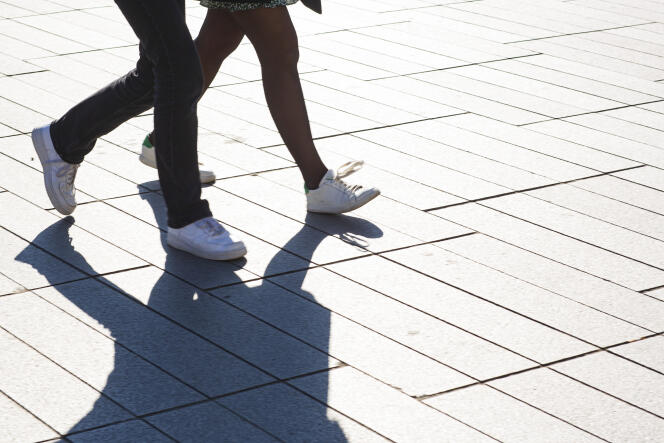


Ten thousand steps and more. One Tuesday in March, there were 10 people – five women and five men – taking part in an exercise to assess their walking speed at the Charléty stadium in Paris. These employees of the French Athletics Federation (FFA) didn't think twice about braving the rain to take part in this test, conducted at the initiative of the sports organization. "We know how fast we drive, how fast we cycle, how fast we run, but rarely how fast we walk," noted Thibault Deschamps, FFA adviser for national sport health enterprises.
Participants first had to walk to a cone at a slow pace (3 km/h), in 36 seconds, and return to the starting point, then to another cone at 3.5 km/h, and so on up to 8 km/h, a fast walking pace, the average being around 5 km/h. A beep told them if they were at the right pace. Flexibility and balance workshops were then offered to identify any deficiencies and, above all, prevent injury.
But what's the point of knowing how fast you're walking? "The aim is to increase your aerobic capacity, lower your resting heart rate and see when you start to sweat," explained FFA coach Ali Saddedine. "It's above this threshold that walking is effective for improving endurance. Below that, it's just window-dressing, even if it's better than nothing," continued the coach. "The idea is to determine each person's pace, so as to get each person to go a little faster."
At the end of the test, the participants were soaked... but happy. "It's something easy and visual. You get a good feel for the phases between walking quietly and pushing a little, and you can see where there's room for improvement," said Philippe Boidé, FFA Director of Development. "I felt that at one point I had to use my arms to reach the beep," stressed Céline. Not very athletic, Claudine was apprehensive, but said she was "very happy to have taken part."
The Bicycle and Active Mobility Plan, launched by the government at the end of 2018, has become a Bicycle and Walking Plan for 2023-2027, giving a boost to these two activities that are good for health and the planet. But "walking is still a bit of a 'poor relation', even though it's the most accessible physical activity," lamented Deschamps. "It allows people to reconnect with their bodies and perceptions." What's more, there are no medical contraindications.
Cardiac, respiratory... Walking's effects on physical and mental health are numerous. Among other things, it stimulates cognitive capacity, memory and creativity, and helps combat anxiety and depression.
You have 29.34% of this article left to read. The rest is for subscribers only.
